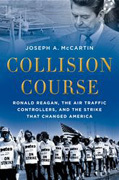
Collision course: ronald reagan, the air traffic controllers, and the strike that changed america
McCartin, Joseph A.
In August 1981, the Professional Air Traffic Controllers Organization (PATCO) called an illegal strike. The new president, Ronald Reagan, fired the strikers, establishing a reputation for both prompt resolution and hostility to organized labor. As Joseph A. McCartin writes, the strike was the culmination of two decades of bitter hostility between labor management that stemmed from the high-pressure nature of the job and the controllers>' lack of control in the workplace. Thefall of PATCO not only ushered in a long period of labor decline; it also served as a harbinger for the current campaign against public sector unions that now roils American politics. Collision Course sets the strike within a vivid panorama of the rise and near fall of the world>'s busiest air-traffic control system. It begins with an arresting account of the mid-air collision in 1960 over Park Slope, Brooklynthat cost 134 lives and exposed the weaknesses of an overburdened system. Through the stories of controllers like Mike Rock and Jack Maher, who were galvanized into action by the disaster and went on to found PATCO, McCartin describes the camaraderieand professionalism of those who sought to both make the airways safer and enter the ranks of a burgeoning middle class. It climaxes with the story of Reagan and the controllers, who surprisingly endorsed the Republican on the promise that he would address controllers>' grievances. That brief, fateful alliancetriggered devastating miscalculations that changed the course of history, establishing patterns that still govern America>'s labor politics. In August 1981, the Professional Air Traffic Controllers Organization (PATCO) called an illegal strike. The new president, Ronald Reagan, fired the strikers, establishing a reputation for both prompt resolution and hostility to organized labor. As Joseph A. McCartin writes, the strike was the culmination of two decades ofbitter hostility between labor management that stemmed from the high-pressurenature of the job and the controllers>' lack of control in the workplace. Thefall of PATCO not only ushered in a long period of labor decline; it also served as a harbinger for the current campaign against public sector unions that now roils American politics.Collision Course sets the strike within a vivid panorama of the rise and nearfall of the world>'s busiest air-traffic control system. It begins with anarresting account of the mid-air collision in 1960 over Park Slope, Brooklyn that cost 134 lives and exposed the weaknesses of an overburdened system. Through the stories of controllers like Mike Rock and Jack Maher, who were galvanized into action by the disaster and went on to found PATCO, McCartin describesthe camaraderieand professionalism of those who sought to both make the airways safer and enter the ranks of a burgeoning middle class. It climaxes with the story of Reagan and the controllers, who surprisingly endorsed the Republican on the promise that he would address controllers>' grievances. That brief, fateful alliance triggereddevastating miscalculations that changed the course of history, establishing patterns that still govern America>'s labor politics.Written with an eye for detail and a grasp of the vast consequences of PATCO conflict for both air travel and America>'s working class, Collision Courseis a stunning achievement. Prologue: Getting the Picture1. The Main Bang2. Pushing Back3. Wheels Up4. Confliction5. Course Correction6. Flight Ceiling7. Turbulence8. Down the Tubes9. Pilot Error10. Dead Reckoning11. Trading Paint12. Aluminum Rain13. Debris FieldEpilogue: Black BoxAcknowledgments
- ISBN: 978-0-19-983678-9
- Editorial: Oxford University
- Encuadernacion: Cartoné
- Páginas: 496
- Fecha Publicación: 03/11/2011
- Nº Volúmenes: 1
- Idioma: Inglés
